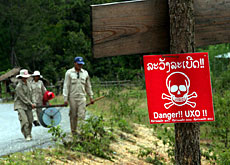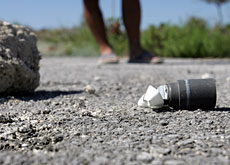Swiss deminers clear path for 70,000 in Laos

A Swiss-based demining organisation has announced a two-year operation to clear hundreds of hectares of farmland in Laos heavily contaminated by unexploded ordnance.
The Swiss Foundation for Mine Action (FSD) aims to return the land to 70,000 inhabitants in central and southern parts of the country that were recently hit by major food shortages.
The two-year project, revealed on the eve of Wednesday’s International Day for Mine Awareness and Assistance in Mine Action, is being funded by the United States and Australia.
According to the Geneva-based FSD, the US Air Force dropped over two million tons of bombs and other ammunition on Laos during the Vietnam War, which ended more than 30 years ago.
Today it is estimated that over 25 million pieces of unexploded ordnance still litter the countryside, injuring and killing over 50 civilians every year and preventing the rural population from planting sufficient crops.
“The biggest problem, besides creating safe land for the people, is that many accidents are happening because both children and adults are searching for scrap metal among the unexploded ordnance,” Christoph Hebeisen, the FSD’s deputy director of operations, told swissinfo. “They buy cheap detectors and head into the fields.”
Hebeisen added that lengthy negotiations had been needed to get the US State Department on board because the region remained “a sensitive issue for them”.
Unexploded ordnance
The problem of unexploded ordnance in the southeast Asian country, which is one of the world’s poorest, was brought sharply into focus last year. Tens of thousands of people in affected areas in the centre and south fell victim to serious food shortages owing to drought and severe flooding.
To be able to produce enough food, affected communities urgently need to expand rice production and increase the number of fishponds, says the FSD. The project is being run jointly with the Rome-based World Food Programme (WFP).
Since the start of its operations in Laos in March 2006, five international experts of the FSD -along with young Laotian deminers, trained within the affected communities – have secured and decontaminated 50 hectares of agricultural land for around 5,000 inhabitants of 20 villages.
They plan to clear a further 500 hectares over the next two years but Hebeisen admits that this is merely a “drop in the ocean”.
“It’s not like we are going to solve the majority of the problems,” he said. “There needs to be a distinct expansion over the next few years. But there are few actors in Laos and the donor cake is small.”
The FSD is active in almost ten countries including Burundi, Angola, Iran, Sudan and Sri Lanka. Two of its mine clearance experts were killed last August in southern Sudan.
swissinfo, Adam Beaumont
Wednesday is the second International Day for Mine Awareness and Assistance in Mine Action.
According to the UN, landmines and explosive remnants of war continue to kill or injure as many as 15,000 people a year.
The overwhelming majority are civilians who trigger these devices years or even decades after a conflict ends. In some countries, such as Afghanistan, the majority of victims are under the age of 18.
Mine action programmes and the anti-personnel mine-ban treaty or “Ottawa Convention”, have led to a reduction in the annual number of casualties from an estimated 26,000 a decade ago to between 15,000 and 20,000 today.

In compliance with the JTI standards
More: SWI swissinfo.ch certified by the Journalism Trust Initiative











You can find an overview of ongoing debates with our journalists here . Please join us!
If you want to start a conversation about a topic raised in this article or want to report factual errors, email us at english@swissinfo.ch.